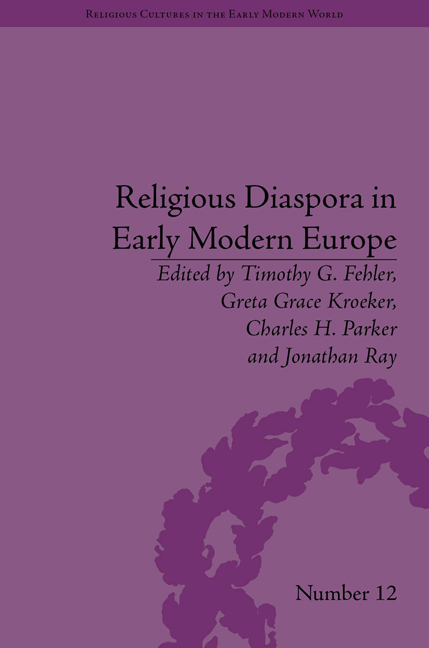Book contents
- Frontmatter
- CONTENTS
- Acknowledgements
- List of Contributors
- List of Figures
- Introduction
- Part I Tactics for Inclusion
- Part II Programmes of Restoration
- Part III Methods of Coping
- 8 Freedom as Exile: Michael Servetus and the Alumbrados
- 9 Coping with Poverty: Dutch Reformed Exiles in Emden, Germany
- 10 Anabaptist Migration to Moravia and the Hutterite Brethren
- 11 Chaos and Community: 1492 and the Formation of the Sephardic Diaspora
- 12 Displaced Intellectuals and Rebuilt Networks: The Protestant Exiles from the Lands of the Bohemian Crown
- Notes
- Index
9 - Coping with Poverty: Dutch Reformed Exiles in Emden, Germany
from Part III - Methods of Coping
- Frontmatter
- CONTENTS
- Acknowledgements
- List of Contributors
- List of Figures
- Introduction
- Part I Tactics for Inclusion
- Part II Programmes of Restoration
- Part III Methods of Coping
- 8 Freedom as Exile: Michael Servetus and the Alumbrados
- 9 Coping with Poverty: Dutch Reformed Exiles in Emden, Germany
- 10 Anabaptist Migration to Moravia and the Hutterite Brethren
- 11 Chaos and Community: 1492 and the Formation of the Sephardic Diaspora
- 12 Displaced Intellectuals and Rebuilt Networks: The Protestant Exiles from the Lands of the Bohemian Crown
- Notes
- Index
Summary
Recounting a tumultuous half-year winter journey, during which 175 Dutch religious refugees from London had been expelled from city after city in Denmark and northern Germany, one of the refugee leaders wrote, ‘After our difficult wanderings, the Lord God … gave us places with the illustrious dowager, the Countess of East Frisia; both the ministers and citizens of Emden lavished on us every courtesy of humane hospitality’. The arrival in Emden, Germany, of these members of the Dutch refugee church which had been forced to flee from their exile in London in 1553 began an era of massive immigration into Emden as religious persecution increased in the neighbouring Netherlands and especially after war began in the 1560s. Could the ‘humane hospitality’ of the local community – from citizens as well as from religious and political leaders, according to the quotation – continue even after war dislocations set off an explosion of religious immigration into Emden, causing the population to increase by 400–500 per cent during the two decades after 1550? The elaboration of a more extensive and sophisticated system of poor relief was an absolute necessity if the city institutions were not to break down under the strain of new demands placed on local resources. Indeed, for exile as a haven from persecution to be viable, it required poor relief.
- Type
- Chapter
- Information
- Religious Diaspora in Early Modern EuropeStrategies of Exile, pp. 121 - 136Publisher: Pickering & ChattoFirst published in: 2014

